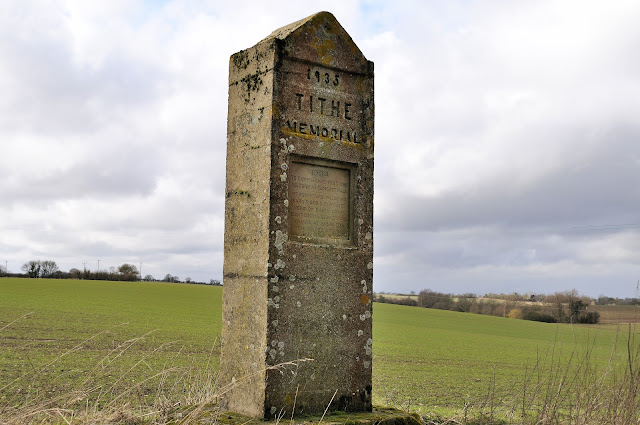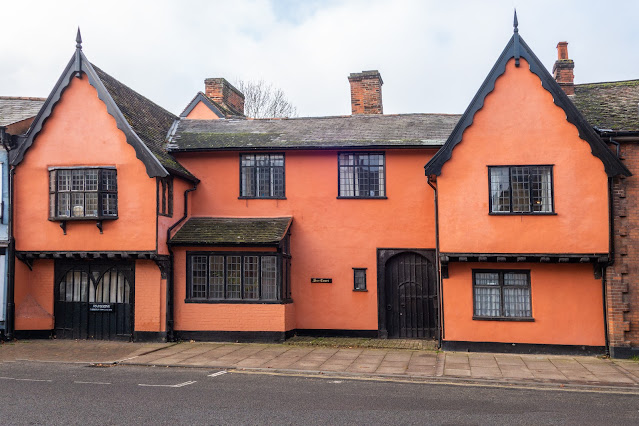The Tithe War
The Elmsett tithe memorial is one of several reminders in Suffolk of the battle fought by small farmers against the demands from the Church for payment of tithes. It also recalls a now largely forgotten but rather murky period in East Anglian local politics.
In the 1930s, agriculture in England experienced a deep depression, and it was very hard to make the land pay. The Church of England had undergone much modernisation over the previous century, but even so, there were still parishes where the tithe system meant that even small landowners were legally obliged to contribute a proportion of their income to the church for the upkeep of its incumbent. This was the case even if they were not Anglicans, which in Suffolk many were not. In addition, many of the smaller landowners were supporters of the Liberal Party, but the governing Conservative Party, which many of the larger landowners supported, stood foursquare behind the Church in the matter.
If the landowners refused to pay, the courts could enforce tithe seizures by bailiffs, who in many cases would take goods valued at far more than the unpaid tithes.
The Elmsett Tithe Memorial recalls such an incident, just one of many, in which possessions were seized from the home of a land owner in lieu of payments to the Church. It reads 1934. To commemorate the Tithe seizure at Elmsett Hall of furniture including baby's bed and blankets, herd of dairy cows, eight corn stacks and seed stacks valued at £1200 for tithe valued at £385.
Charles Westren, the farmer in question, had refused to pay his tithes to the church. After the seizure, he set up this monolithic concrete memorial on the edge of his land facing into the gateway of Elmsett church, so that anyone leaving a service would be reminded of the injustice of the system. Westren eventually emigrated to America during the Second World War. The legal abolition of the tithes system in England and Wales was set in motion after the War, the system coming to a final end in the 1970s, by which time very few tithes were still collected because of the cost of doing so.
The memorial is set just opposite the church gates so you cannot fail to see it as you leave. A reminder of the injustice people felt.
Tithe memorial, Elmsett, Suffolk
However, it is salutary for us to recall that the tithe controversy has lingered well into the collective folk memory of modern Suffolk. The tithe protesters received strong support from, among others, the writers Henry Williamson and Doreen Wallace, who would later recall the events in her book The Tithe War, both of whom had small farms in East Anglia.
Their articles in London newspapers had the effect of drumming up considerable discussion, and both writers' sympathies with the British Union of Fascists encouraged that organisation to support the tithe protesters.
The writer George Orwell documented the struggle in his novel A Clergyman's Daughter, as did Henry Williamson in A Norfolk Farm. People in this part of East Anglia gave strong support to the British Union of Fascists in the 1930s, who were vocal in their support for the tithe rebels. Ronald Creasy, a local farmer, was elected as a British Union Councillor for Eye, principally on the issue of the tithe protests.
In 1934, Doreen Wallace and her husband Rowland Rash refused to pay their tithes for Wortham Manor farm. For sixteen days, some fifty members of the British Union of Fascists surrounded the farm to stop the court's bailiffs gaining access to remove goods. They were confronted by lines of police drafted in from Ipswich, and then many were arrested on a technicality and carted off to prison in Norwich. Hard to imagine, now. The events are remembered by a memorial similar to that at Elmsett in a country lane near Wortham Manor.
[Just think - in 2018 this was one report of the CofE value: "The Church’s property portfolio and investments are immense. It is sitting on a combination of ancient endowments and investments worth £8.3bn, which last year alone increased by £400m. These earnings are enough to make the CofE by far the UK’s biggest charity, with an income more than three times that of Oxfam."]






Comments